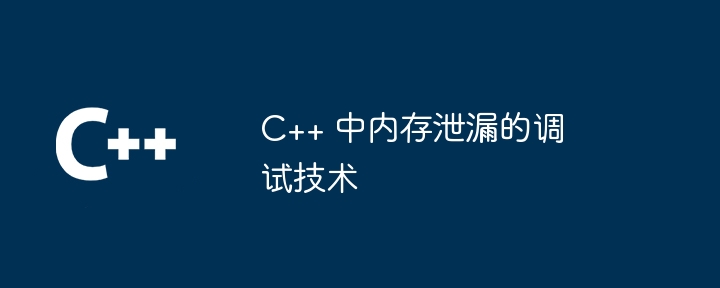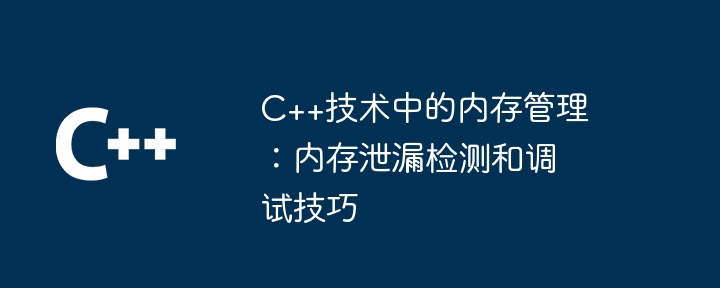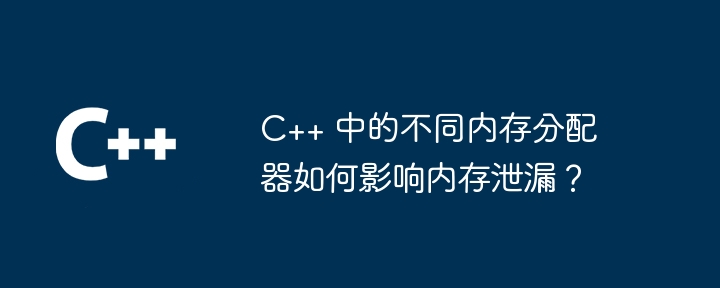Found a total of 10000 related content

PHP Memory Leak Detection: Identifying and Resolving Memory Leaks
Article Introduction:Answer: PHP memory leaks are caused by circular references, causing the application to occupy more and more memory. Steps: Detect memory leaks: Use tools such as debug_backtrace(), xdebug or PHP-GC. Practical case: Circular references can cause memory leaks, such as: ObjectA and ObjectB refer to each other. Solve memory leaks: use weak references, unset() or redesign the code. Prevent memory leaks: Enable PHP garbage collection, check your code regularly, and use tools to detect and resolve memory leaks.
2024-06-02
comment 0
935

C# Memory Leak
Article Introduction:Guide to C# Memory Leak. Here we discuss How Does Memory Leak Work in C# and Examples along with the codes and outputs in detail.
2024-09-03
comment 0
410

Types and consequences of memory leaks in C++
Article Introduction:Memory leak type: Blocked memory leak: New allocated memory is not freed Object leak: The underlying memory is still in use after the object disappears Memory local leak: Memory allocated within a function is not released when the function returns Consequences: The application runs out of memory Performance degradation Security loopholes
2024-05-04
comment 0
1087

OutOfMemoryException in Java - How to solve memory leak?
Article Introduction:Java is a relatively safe and fast development language compared to other languages. However, due to the existence of memory leaks, the program will crash due to excessive memory usage. In Java, OutOfMemoryException is a very common error. This error is usually caused by a memory leak. In order to minimize errors caused by memory leaks while your program is running, this article will introduce memory leaks in Java and how to avoid them. 1. What is a memory leak? A memory leak occurs when a program allocates memory
2023-06-25
comment 0
1514

What is the difference between memory overflow and memory leak?
Article Introduction:The difference between memory overflow and memory leak is that memory overflow means that the program cannot obtain the required memory space when applying for memory, while memory leak means that the memory allocated by the program during running cannot be released normally. Memory overflow is usually due to the needs of the program. The memory exceeds the available memory limit, or recursive calls cause stack space to be exhausted, or memory leaks are caused by unreleased dynamically allocated memory in the program, object references that are not released correctly, or circular references. of.
2023-08-21
comment 0
3372

Memory management in C++ technology: typical case analysis of memory leaks
Article Introduction:Common types of memory leaks in C++ include stack leaks, heap leaks and global leaks. This article analyzes heap leaks through a practical case. In this example, a dynamically allocated pointer loses scope when the function returns, but the allocated memory is not released, resulting in a memory leak. Memory leaks can be prevented using smart pointers, manual memory release, or memory detection tools.
2024-05-08
comment 0
725


Debugging techniques for memory leaks in C++
Article Introduction:A memory leak in C++ means that the program allocates memory but forgets to release it, causing the memory to not be reused. Debugging techniques include using debuggers (such as Valgrind, GDB), inserting assertions, and using memory leak detector libraries (such as Boost.LeakDetector, MemorySanitizer). It demonstrates the use of Valgrind to detect memory leaks through practical cases, and proposes best practices to avoid memory leaks, including: always releasing allocated memory, using smart pointers, using memory management libraries, and performing regular memory checks.
2024-06-05
comment 0
641

How to solve memory leak problem in Java
Article Introduction:How to solve the memory leak problem in Java, specific code examples are needed Summary: Java is a high-level object-oriented programming language. During the development process, we often encounter memory leak problems. This article will introduce what a memory leak is and how to solve the memory leak problem in Java with specific code examples. What is a memory leak? A memory leak refers to the situation where the memory space applied for in the program is not released correctly after use. If the memory leak problem is not dealt with in time, it will cause the program's memory consumption to increase.
2023-10-08
comment 0
613

C++ memory leak problem analysis and solutions
Article Introduction:Analysis and solutions to C++ memory leak problems In the development process of C++, memory leaks are a common problem. When a program dynamically allocates memory but does not release it correctly, memory will continue to accumulate while the program is running, eventually exhausting the system's available memory. Memory leaks will not only affect the performance of the program, but may also cause the program to crash or even the system to crash. Therefore, it is very important to detect and solve memory leak problems in time. Below, we will analyze the causes of memory leaks, tools to find memory leaks, and methods to solve memory leaks.
2023-10-09
comment 0
1718

Thread safety and memory leaks in C++
Article Introduction:Thread safety and memory leaks in C++ In a multi-threaded environment, thread safety and memory leaks are crucial. Thread safety means that a data structure or function can be safely accessed in a concurrent environment, requiring the use of appropriate synchronization mechanisms. A memory leak occurs when allocated memory is not released, causing the program to occupy more and more memory. To prevent memory leaks, these best practices should be followed: Use smart pointers such as std::unique_ptr and std::shared_ptr to manage dynamic memory. Using RAII technology, resources are allocated when the object is created and released when the object is destroyed. Review code to identify potential memory leaks and use tools like Valgrind to detect leaks.
2024-06-03
comment 0
377

Memory Management in C++ Technology: Memory Leak Detection and Debugging Tips
Article Introduction:Detect memory leaks Use tools such as Valgrind to detect memory leaks. Use MSVisualStudioMemoryProfiler to identify leaks. Find leaks with the help of C++ RuntimeLibrary functions such as _CrtDumpMemoryLeaks(). Debugging Tips Use a debugger to step through a program, examining variable values to identify leaks. Add log statements to track memory allocation and deallocation. Use smart pointers (such as std::unique_ptr and std::shared_ptr) to automatically manage memory and reduce the risk of leaks.
2024-05-08
comment 0
1039

How do different memory allocators in C++ affect memory leaks?
Article Introduction:The impact of different C++ memory allocators on memory leaks: System allocator: does not provide functionality to track or prevent memory leaks. STL allocator: supports memory pool tracing, but lacks advanced debugging tools. TBB allocator: dedicated to multi-threading, providing thread safety, debugging tools and memory leak detection. TCMalloc: Provides efficient memory management and leak detection for large data sets and high-performance applications. Jemalloc: Efficient, scalable, and memory-friendly, including memory leak detection and debugging.
2024-06-01
comment 0
1094

Potential consequences of memory leaks in C++
Article Introduction:A memory leak occurs when an application fails to free memory space allocated for data that is no longer needed, which can lead to performance degradation, system crashes, security vulnerabilities, and testing difficulties. Memory leaks can be detected using tools such as Valgrind, AddressSanitizer (ASan), and Visual Studio Memory Profiler, and best practices such as always freeing memory correctly, using smart pointers, utilizing memory debugging tools, and following coding conventions to avoid memory leaks.
2024-06-06
comment 0
1145

Performance impact of memory leaks in C++
Article Introduction:Memory leaks can have significant performance impacts on C++ programs, including memory exhaustion, performance degradation, and uncertainty. It is crucial to detect and fix memory leaks promptly using tools like Valgrind, especially when using dynamic memory allocation (such as std::vector). By using smart pointers, you can avoid memory leaks and ensure program reliability.
2024-06-04
comment 0
1154


How to prevent memory leaks in Java
Article Introduction:1. What is a memory leak? Definition of a memory leak: Objects are no longer used by the application, but the garbage collector cannot delete them because they are being referenced. To understand this definition, we need to understand the state of objects in memory. The image below illustrates which ones are unused and which ones are unreferenced. In the diagram, there are referenced objects and unreferenced objects. Unreferenced objects will be garbage collected, while referenced objects will not be garbage collected. An unreferenced object is definitely unused because no other objects refer to it. However, not all unused objects are unreferenced. Some of them are being referenced! That's where the memory leak comes from. 2. Why memory leaks occur Let us look at the following example to see why memory leaks occur. below
2023-06-03
comment 0
1547

How to detect and solve memory leaks under Linux
Article Introduction:A memory leak refers to the phenomenon that a program applies for memory space but does not release it in time during the running process, causing more and more memory to be occupied, and even causing the system to crash. Memory leak is a common software defect, and it is also a problem that cannot be ignored for Linux systems. So, how to find and fix memory leaks under Linux? What tools can help us detect and analyze memory leaks? This article will introduce you to several commonly used memory leak tools under Linux, allowing you to better manage and optimize memory resources under Linux. Memory leaks can be divided into the following categories: 1. Frequent memory leaks. Code with memory leaks will be executed multiple times, causing a memory leak every time it is executed. 2. I
2024-02-12
comment 0
871

How to Fix: Java Performance Error: Memory Leak
Article Introduction:How to Fix: Java Performance Error: Memory Leak Java is a high-level programming language that is widely used in the field of software development. However, although Java has an automatic garbage collection mechanism, there is still a common problem, namely memory leaks. A memory leak refers to the fact that the heap memory used in the program is not released in time, causing the memory usage to continue to increase, eventually causing the program to run slowly or even crash. This article will introduce how to solve the memory leak problem in Java and give corresponding code examples. Understand the causes of memory leaks
2023-08-22
comment 0
701

What are the common types of C++ memory leaks?
Article Introduction:Common types of memory leaks in C++ include dangling pointers, resource leaks, wild pointers, and memory growth. Dangling pointers refer to pointers to freed memory; resource leaks refer to allocated system resources that are not released; wild pointers refer to pointers to uninitialized memory; memory growth is due to gradual, uncontrollable memory accumulation. In practice, even simple classes can cause dangling pointer leaks if not carefully managed.
2024-06-03
comment 0
542



















